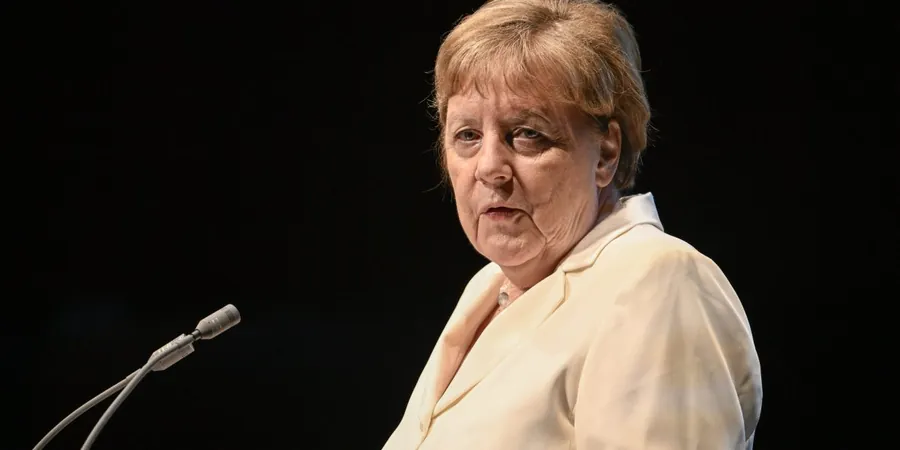
Angela Merkel’s Legacy Under Fire as Germany Faces Political Turmoil Ahead of Snap Elections
2024-11-21
Author: Yan
Angela Merkel’s Legacy Under Fire
Angela Merkel, once celebrated as one of the most popular politicians globally, now finds herself under increasing scrutiny over her legacy, especially as her new book, co-authored with longtime adviser Beate Baumann, titled Freedom, is set to launch in 30 languages on Tuesday. This release comes at a critical time when Germany is grappling with significant political challenges ahead of snap elections scheduled for February.
The much-anticipated 736-page book aims to unveil the complexities of Merkel's four terms in office from 2005 to 2021, a period during which she was deemed the world’s most powerful woman. However, the atmosphere has shifted dramatically since her departure, with critics quick to pounce on the perceived failures of her administration.
Critics on Merkel's Tenure
Eckart Lohse, a prominent journalist at Frankfurter Allgemeine Zeitung, asserts in his book, The Illusion, that Merkel has "left behind a country full of unfinished business." Similarly, The Economist pointed out that "16 years of no reforms are taking a toll on Germany and Europe," reflecting a profound shift in public sentiment about her tenure.
Political Analysts' Perspectives
Political analysts, including Wolfgang Schroeder, note that the ongoing war in Ukraine and the collapse of Germany’s export-oriented economic model have drastically reshaped the landscape since Merkel’s retirement, pushing the country into a recession. In fact, Germany has been singular among major advanced economies, contracting by 0.2 percent this year, as concerns mount over deteriorating infrastructure, particularly in transport and digital sectors.
Stability vs Stagnation
While Merkel’s era was characterized by stability—a quality highly valued by German voters—critics argue that this consistency often evolved into stagnation. The term “merkeln,” referring to delaying decision-making, has become synonymous with her governing style.
International Dependencies
On the international front, Merkel’s foreign policy decisions continue to haunt Germany. Analysts highlight a "trifecta of dangerous dependencies" left behind: an inability to defend itself without American support, reliance on Chinese exports for growth, and dependence on Russian gas for industrial energy. The infamous Nord Stream 2 gas pipeline, supported by Merkel’s administration even after Russia annexed Crimea in 2014, is now widely recognized as a strategic blunder, especially in light of recent geopolitical tensions following Russia's invasion of Ukraine.
Public Expectations vs Political Decisions
Yet, some argue that these choices aligned with the preferences of the German business community at the time, as noted by former CDU lawmaker Norbert Lammert. Merkel's decisions often mirrored public expectations, such as the shift away from nuclear energy after the Fukushima disaster in 2011 and the controversial opening of Germany’s borders to hundreds of thousands of migrants in 2015. This influx significantly contributed to the rise of the far-right Alternative for Germany (AfD), which is currently polling in second place ahead of the upcoming elections, trailing only Merkel's Christian Democrats under Friedrich Merz.
Current Political Landscape
The current government, led by Social Democrat Chancellor Olaf Scholz—the former finance minister in Merkel's cabinet—has responded to growing concerns by extending border controls and tightening asylum benefits. Meanwhile, Merz's promise to reform the much-debated 'debt brake'—a fiscal rule staunchly defended by Merkel during her tenure—could backfire, as it might alienate segments of his own party loyal to Merkel’s policies.
Looking Ahead
As the political landscape evolves and public support dwindles, the resilience of Merkel’s legacy remains a pivotal theme in the debate over Germany’s future. What remains certain is that the impact of her time in office will continue to reverberate amid an increasingly challenging political climate.





 Brasil (PT)
Brasil (PT)
 Canada (EN)
Canada (EN)
 Chile (ES)
Chile (ES)
 España (ES)
España (ES)
 France (FR)
France (FR)
 Hong Kong (EN)
Hong Kong (EN)
 Italia (IT)
Italia (IT)
 日本 (JA)
日本 (JA)
 Magyarország (HU)
Magyarország (HU)
 Norge (NO)
Norge (NO)
 Polska (PL)
Polska (PL)
 Schweiz (DE)
Schweiz (DE)
 Singapore (EN)
Singapore (EN)
 Sverige (SV)
Sverige (SV)
 Suomi (FI)
Suomi (FI)
 Türkiye (TR)
Türkiye (TR)